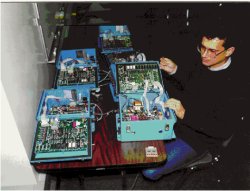![]()
Year 2000 Issues
U.S. Experts Helping Soviet-Designed Power Plant Personnel Deal With Y2K
|
US Dept. of Energy Office of International Nuclear Safety and Cooperation 1000 Independence Ave S.W. Washington, DC 20585 (202) 586-6641 https://insp.pnnl.gov:2080/ |
The potential effects of the Year 2000 (Y2K) computer issue present as much of a challenge abroad as they do in the United States. Of particular concern to U.S. officials is the Y2K preparedness of nuclear power plants in the former Soviet Union countries. Beginning last year, the United States undertook a Y2K education program in countries with Soviet-designed nuclear power plants, providing the information necessary to address the problem. Most of the countries have adopted guidelines established by the International Atomic Energy Agency (IAEA) for conducting Y2K assessments.
Information collected by the U.S. Y2K team in Moscow indicates Russia has established a well-organized Y2K program. Rosenergoatom soon will complete Y2K assessments at all nuclear power plants. Ukraine has completed limited assessments. Current information indicates that no problems exist within the primary safety systems at the nuclear power plants. These systems monitor operation of the plant and automatically shut it down if serious problems arise. Preliminary assessments indicate safety systems will continue to function properly, regardless of any minor Y2K problem. Several issues are pending:
The U.S. Department of Energy (DOE) will support host country Y2K assessments, help correct known deficiencies, and assist in the completion of contingency planning in Russia, Armenia, Kazakhstan, and Ukraine. It is clear that all the countries with Soviet-designed nuclear power plants understand the Y2K issue and the potential problems. To varying degrees, all have programs to address the issues and are pursuing solutions. For additional information, see INSP Year 2000 Information |
